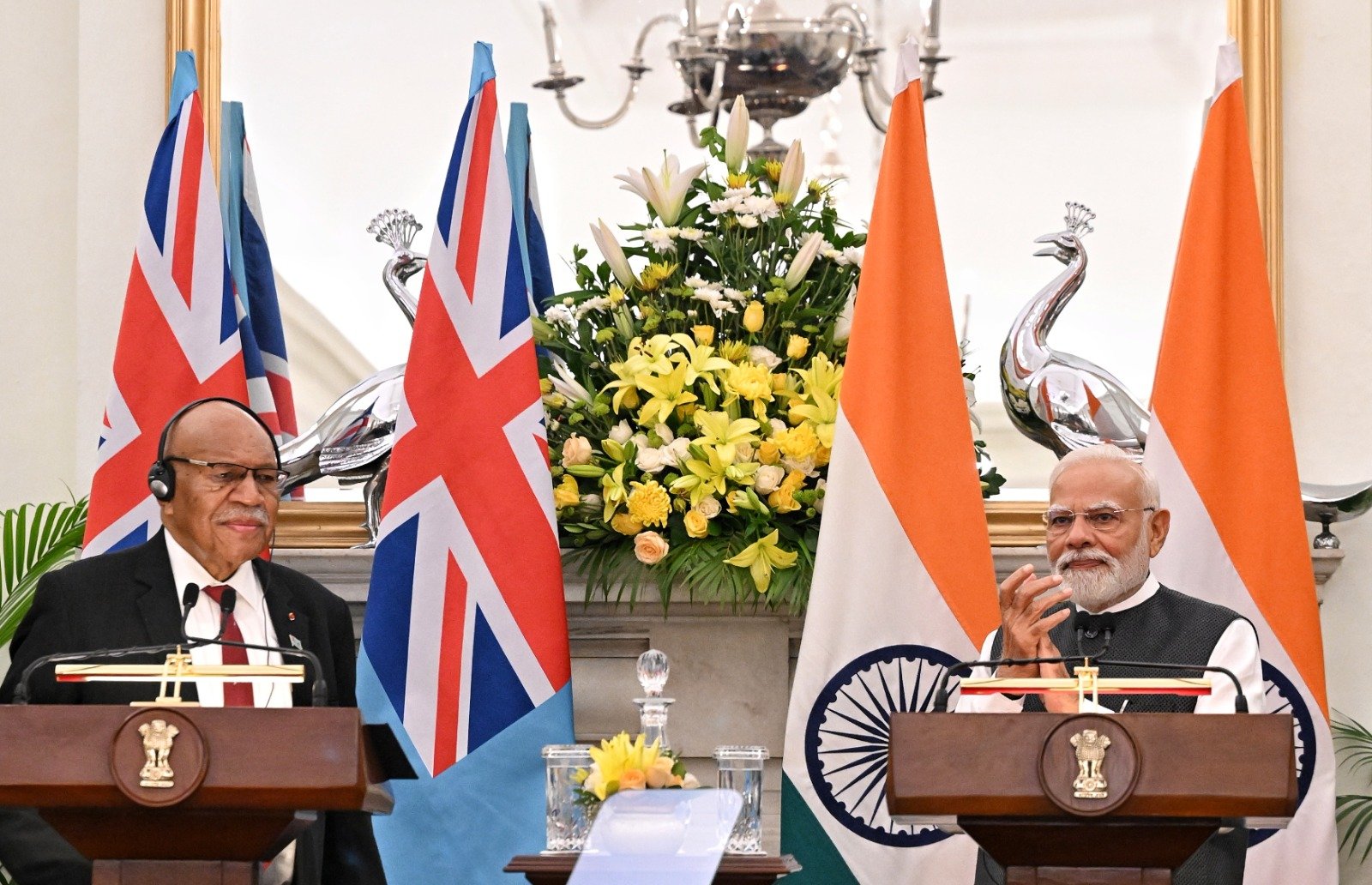How India and Fiji’s Historical Ties Are Shaping A Modern Partnership Across Health, Defence, And The Indo-Pacific
In a visit laden with symbolism and substance, Fiji’s Prime Minister Sitiveni Rabuka concluded a high-level official trip to India from August 24 to 26, 2025, marking a significant step forward in the evolving India–Pacific strategic axis.
Hosted by Indian Prime Minister Narendra Modi, the visit produced multiple memoranda of understanding (MoUs) and announcements across a wide spectrum of cooperation--from health and defence to climate resilience, agriculture, education, and digital connectivity.
 |
| Image Source: PM NaMo |
Today, descendants of this community form a crucial link between the two nations and embody a unique cultural bridge in the Pacific.
But the 2025 summit was focused not on the past, but on building the future—with tangible agreements underscoring a long-term strategic and developmental vision shared by New Delhi and Suva.
A Partnership Anchored in Access
Among the most ambitious outcomes of the visit is the construction of a 100-bed Super-Specialty Hospital in Suva, which Prime Minister Modi described as India’s largest grant-in-aid project in the Pacific region to date. The facility will include services in tertiary care, telemedicine, and emergency response.
Additional initiatives include:
-
Gifting of ambulances to the Republic of Fiji Military Forces.
-
Establishment of Jan Aushadhi Kendras (People’s Pharmacies) in Fiji to ensure affordable access to generic medicines.
-
Collaboration under the ‘Heal in India’ programme, enabling up to ten Fijians annually to access advanced medical care in Indian hospitals.
-
The second Jaipur Foot Camp, supporting amputees with free prosthetics and rehabilitation support.
-
Agreement for supply of medicines under India’s Jan Aushadhi scheme between HLL Lifecare Ltd and Fiji’s health ministry.
This comprehensive healthcare package is tied to India’s broader development diplomacy goals and aligns with Fiji’s national resilience agenda.
Building a Stable Indo-Pacific
The visit also strengthened the India-Fiji defence and security partnership, which has gained momentum since the signing of a defence MoU in 2017.
Key announcements included:
-
Creation of a Defence Attaché post in India’s High Commission in Suva.
-
Establishment of a Cyber Security Training Cell (CSTC) in Fiji.
-
Indian naval ship port call to Fiji, enhancing maritime interoperability.
-
Enhanced cooperation in military medicine, white shipping data exchange, and UN peacekeeping operations.
India reaffirmed support for securing Fiji’s Exclusive Economic Zone (EEZ), echoing the growing Indo-Pacific consensus on maritime domain awareness and resilience. Both leaders reiterated commitment to a free, open, inclusive, and rules-based Indo-Pacific, with Fiji formally joining India’s Indo-Pacific Oceans Initiative (IPOI).
Agriculture, Food Security, and Rural Innovation
In a boost to climate-resilient agriculture and rural innovation, India announced:
-
Donation of 12 agricultural drones and 2 mobile soil testing labs to Fiji’s Sugar Research Institute.
-
Deployment of an ITEC expert to Fiji Sugar Corporation.
-
Specialized ITEC training programs for Fijian agriculture professionals.
-
Delivery of 5 metric tonnes of high-quality cowpea seeds, already showing successful growth in Fijian soil.
India and Fiji also finalized a MoU between NABARD and Fiji Development Bank to promote financial inclusion and agricultural financing.
These initiatives reflect India’s strategic pivot toward capacity building and technology sharing, especially within the Global South framework.
Education, Culture, and Language Revival
Cultural diplomacy remains central to India’s soft power outreach. During this visit:
-
A Hindi and Sanskrit teacher will be deputed to the University of Fiji.
-
Fijian Pundits will receive training in India and participate in the International Geeta Mahotsav (IGM) 2025.
-
A local Geeta Mahotsav will also be held in Fiji, timed with celebrations in India.
India also reaffirmed its commitment to capacity building under the Indian Technical and Economic Cooperation (ITEC) Programme, offering scholarships, technical training, and human capital development.
People-to-People Connections
The visit saw the signing of a Declaration of Intent on Migration and Mobility, facilitating smoother movement for students, professionals, and skilled workers between the two countries.
Additionally:
-
Fijian parliamentarians and a delegation of the Great Council of Chiefs (GCC) will visit India in 2026.
-
India thanked Fiji for allocating land for the Chancery-cum-Cultural Centre in Suva, with reciprocal arrangements in New Delhi since 2015.
These symbolic and structural initiatives aim to deepen interpersonal bonds, beyond formal diplomacy.
Shared Climate Goals and Pacific Resilience
Recognizing Fiji’s vulnerability to climate change, India emphasized cooperation in:
-
Solar energy deployment via the International Solar Alliance (ISA).
-
Disaster resilience through the Coalition for Disaster Resilient Infrastructure (CDRI).
-
Biofuels development under the Global Biofuels Alliance (GBA).
A STAR-Centre will be established at Fiji National University, focusing on solar energy training and deployment. India will also support Fiji’s climate adaptation and resilience goals through technical assistance and advocacy at global forums.
The Global South and Multilateral Cooperation
India and Fiji used the visit to amplify the voice of the Global South, reaffirming their commitment to:
-
United Nations reform, including India’s bid for a permanent seat on the UN Security Council.
-
Equitable global governance, especially in addressing development challenges of small island nations.
-
Continued engagement through platforms like the Voice of Global South Summits and the Global South Centre of Excellence (DAKSHIN).
Prime Minister Rabuka acknowledged India’s leadership in championing the priorities of developing countries, especially across healthcare, education, and digital public infrastructure.
A Shared Vision Beyond the Ocean
While geographically distant, India and Fiji’s relationship is rooted in shared history, mutual respect, and forward-looking cooperation. As PM Modi summarized, “India and Fiji may be oceans apart, but our aspirations sail in the same boat.”
The 2025 summit marks a significant milestone in shaping a people-centric, climate-conscious, and security-anchored partnership.
In the ever-shifting geopolitics of the Indo-Pacific, New Delhi and Suva are demonstrating how small island nations and emerging economies can forge meaningful partnerships grounded in equality, empathy, and empowerment.
